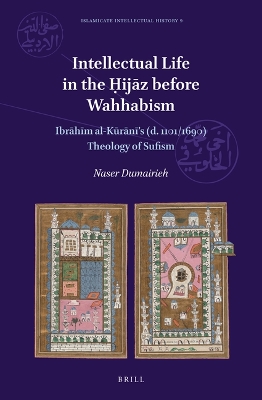Islamicate Intellectual History
1 primary work • 2 total works
Book 9
In Intellectual Life in the Ḥijāz before Wahhabism, Naser Dumairieh argues that, as a result of changing global conditions facilitating the movement of scholars and texts, the seventeenth-century Ḥijāz was one of the most important intellectual centers of the Islamic world, acting as a hub between its different parts.
Positioning Ibrāhīm al-Kūrānī (d. 1101/1690) as representative of the intellectual activities of the pre-Wahhabism Ḥijāz, Dumairieh argues that his coherent philosophical system represents a synthesis of several major post-classical traditions of Islamic thought, namely kalām and Akbarian appropriations of Avicennian metaphysics. Al-Kūrānī’s work is the culmination of the philosophized Akbarian tradition; with his reconciliation of Ibn ʿArabī’s ideas with Ashʿarī theology, Ibn ʿArabī’s ideas became Islamic theology.
Positioning Ibrāhīm al-Kūrānī (d. 1101/1690) as representative of the intellectual activities of the pre-Wahhabism Ḥijāz, Dumairieh argues that his coherent philosophical system represents a synthesis of several major post-classical traditions of Islamic thought, namely kalām and Akbarian appropriations of Avicennian metaphysics. Al-Kūrānī’s work is the culmination of the philosophized Akbarian tradition; with his reconciliation of Ibn ʿArabī’s ideas with Ashʿarī theology, Ibn ʿArabī’s ideas became Islamic theology.

